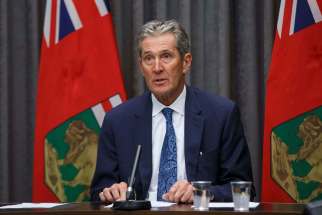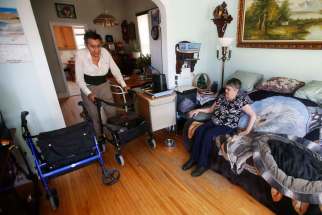Pallister announces one-time bonus payment for low-wage front-line workers
Read this article for free:
or
Already have an account? Log in here »
To continue reading, please subscribe:
Monthly Digital Subscription
$19 $0 for the first 4 weeks*
- Enjoy unlimited reading on winnipegfreepress.com
- Read the E-Edition, our digital replica newspaper
- Access News Break, our award-winning app
- Play interactive puzzles
*No charge for 4 weeks then billed as $19 every four weeks (new subscribers and qualified returning subscribers only). Cancel anytime.
Read unlimited articles for free today:
or
Already have an account? Log in here »
Hey there, time traveller!
This article was published 01/06/2020 (1422 days ago), so information in it may no longer be current.
Nurses and police are among those eligible to apply for a risk-recognition payment for front-line workers during the pandemic, but most of them — along with employees making only a few dollars more than minimum wage — will be disqualified because they earn more than $2,500 a month.
In announcing the $120-million Manitoba Risk Recognition Program Tuesday, Premier Brian Pallister said his government consulted twice with 15 unions, business leaders and critical service providers who voted on the parameters of the federal-provincial initiative.
“They arrived at a consensus that the low-income group gets a lion’s share of the benefit,” Pallister said at a news conference.

The federal-provincial program was announced in April by Prime Minister Justin Trudeau to top-up the wages of low-income Canadians working in essential services during the pandemic. Ottawa will provide up to $3 billion with the provinces and territories offering $1 billion. It was left up to the provinces to decide how to administer it.
The province’s nurses union said the Manitoba process was inappropriate and did not result in a consensus.
“No other province has put the administration of these federal dollars to a vote,” said Darlene Jackson, president of the Manitoba Nurses Union. The MNU provided extensive feedback to the government but it was “unreceptive” so it refused to participate in the vote.
“Pitting nurses against retail workers, truck drivers, and lower-income workers in the midst of a pandemic is simply wrong,” Jackson said in a statement. “As caregivers and advocates, nurses would never want to be put in a position of taking away money from low-income front-line workers. We believe all front-line workers are deserving of recognition and respect.”
The benefit disqualifies those making more than $30,000 a year before taxes, which works out to roughly $14.42 an hour. Manitoba’s minimum wage is $11.65 an hour; $12.50 for security guards. The provincial payment is available to part-time or full-time workers who worked at least 200 hours in the 10-week period between March 20 and May 29 and earned no more than $2,500 per month. Canada Emergency Response Benefit (CERP) recipients are ineligible.
An estimated 100,000 workers would be eligible for the benefit, Pallister said. That amounts to $1,200 per worker but could be more if fewer than 100,000 apply.
“If there are fewer applicants, there will be a bigger cheque per applicant,” said Pallister.
It may not have been the government’s intention to pit the groups it consulted against one another but asking them not to lobby for their constituents was bound to cause some conflict, said United Food and Commercial Workers Local 832 president Jeff Traeger. He also challenged the premier’s assertion that the working group, which UFCW was a part of, arrived at a consensus.
“When I look up that word in the dictionary, ‘consensus’ means everyone agrees,” Traeger said. “A majority decision is not really a consensus.”
The province’s largest private-sector union would have liked to see more front-line workers share a larger pie.
“We would have preferred to see all the front-line workers who were putting themselves at risk recognized,” Traeger said. “It’s difficult to say you’re going to recognize some workers but not others.”
Instead of “watering down” payments to include all front-line workers, Manitoba could have augmented the federal funding so they all received a decent bonus, he said.

“We haven’t seen a whole heck of a lot coming out of this government for workers compared to other provinces,” Traeger said.
As it stands, many UFCW members who make little more than minimum wage with few if any benefits — such as group-home workers looking after the most vulnerable — are eligible for the wage top-up, but there are inconsistencies, he said.
“We’re glad to see them getting some recognition,” Traeger said.
Some security guards — those working in retail at Liquor Marts and grocery stores — can also apply for the benefit but not those at Manitoba Housing, for instance, he said.
Early childhood educators will also be recognized, but a one-time bonus is not enough, advocates say.
“There are systemic issues that our government still continues to ignore,” said Brianne Goertzen, with the Child Care Coalition of Manitoba. Early in the pandemic, the province announced funding for more home-based, private day care to take the place of child-care centre spaces closed by the pandemic.
“It’s not good enough,” Goertzen said.
More licensed child-care centres with trained professionals are what parents require, she said. “Child care is an inherent need on order for people to get back to work.”
carol.sanders@freepress.mb.ca
Manitoba Risk Recognition Program
Online applications will be accepted starting June 3. The deadline to apply is June 18.
Who may be eligible:
Store shelf stockers
Retail salespersons
Cashiers
Cooks
Security guards
Light-duty cleaners in retail facilities
Early childhood educators
Licensed home-based child-care providers
Family violence shelter workers
Social workers
Nurses and nurse practitioners
Paramedics
Health-care aides
Community services workers, including personal-care homes, home care, public health, mental health and addictions
Direct service workers for adults and children with disabilities
Law enforcement , including members of the Winnipeg Police Service, Brandon Police Service and RCMP
Correctional officers
Long-distance truck drivers
Bus drivers
The full list of eligible positions and organizations is available here.
— source: Province of Manitoba

Carol Sanders
Legislature reporter
After 20 years of reporting on the growing diversity of people calling Manitoba home, Carol moved to the legislature bureau in early 2020.
History
Updated on Tuesday, June 2, 2020 6:48 PM CDT: full write-thru, additional formatting







